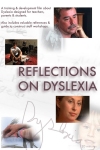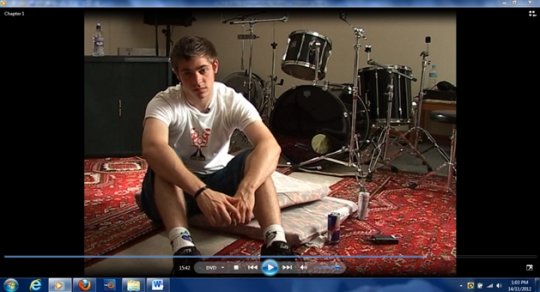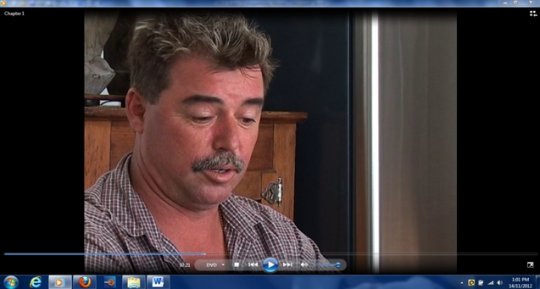Reflections on Dyslexia
Mark Le Messurier

"I'd like to change the world so that no one feels left behind or diminished."
Joan Kirner, 2007
AFTER THE FILM; discussion points to explore with educators, parents and students
What's to be learnt from Jane?

"I might not be able to read and write as well as you, but I beat you in the playground every day when we run or play."
Jane's emotionally healthy attitude shines brightly. She hasn't let her learning disability define her and carries very little emotional baggage these days, despite being able to recall frustrations and embarrassments.
How might we support students we work alongside to develop Jane's healthy attitude?
Firstly, let's lead students to see themselves beyond a 'Dyslexic' or 'specific learning difficulty' label.
Explore how dyslexia affects young people – how they feel about it, what's helped and what's hurt. Make sure you watch this clip from New Zealand
http://tvnz.co.nz/close-up/monday-november-26-5239471
http://tvnz.co.nz/close-up/monday-november-26-5239471/video
Also assist them recognise their talents, unique style and interests. Explain, for example, that the organisation of the brain which produces the dyslexic difficulty is also thought to account for unique artistic, personal, musical, dramatic, athletic abilities and mechanical gifts.
Discuss the idea of strengths versus challenges. Make photographic displays to highlight this dynamic connection. Sadly, some of our students with learning difficulties lose sight of their natural abilities, and as they do, they progressively abandon hope for themselves.
By compartmentalizing problems, individuals are less likely to become overly defined by their difficulties and more likely to see their difficulty as only one aspect of themselves.
I remember a thirteen year old explaining to me how he felt about his Dyslexia. Brett reached for a black jumbo sized texta and a blank sheet of paper. Then, he proceeded to place dozens of dots randomly over the page. He explained that each dot represented something about him. He explained that this dot, as he circled it, is all about my downhill racing, this next one is the naughty enjoyment I get from graffiting, and this one shows how I feel about my friends and so on. Finally, his last circle represented the impact of his significant learning difficulty. From Brett's perspective, his learning difficulty was but one aspect in the richness of his life. Recognising the link between what an individual has as strengths, and what they need to make more of, has a direct influence on tenacity and motivation.
Jane made the point that identifying her learning difficulty and ADHD really helped. It had placed her difficulties into perspective for herself and her family.
"When I found out I had Dyslexia it answered a lot of questions for me, and for my mum."
"Once I found out I felt I'm not just the dumbo. It was about my learning. Then, I knew there were things I could put into place to learn better."
Similarly, Ross commented that, "It's important to know you have Dyslexia."
A simple thing to do is to investigate a few of the amazing individuals from the past and present identified with learning difficulties. Guide students to discover their rich, wonderful lives, and the contributions these people have made. Many of their autobiographies and biographies are inspirational. Look at the problems they faced, how they got around them and why they became successful. Highlight that most individuals identified with a learning difficulty say they would never trade away their difficulty because without it they would not be complete. Take a look at these clips;
http://www.youtube.com/watch?v=l_qGJ9svUbM
http://www.youtube.com/watch?v=fj4dKpuKF9E
http://www.youtube.com/watch?v=VLHtyAsKDkQ
http://www.youtube.com/watch?v=R2ydTj7L5Ec
http://www.youtube.com/watch?v=RCYnvqXB5aw
http://www.youtube.com/watch?v=TqLdXlAurjo
http://www.youtube.com/watch?v=U-Q1iu6Q6WI
http://www.youtube.com/watch?v=5qvqG9z0PZo
http://www.youtube.com/watch?v=9e8SJFuGRFM
http://www.bbc.co.uk/schoolreport/21858342
http://www.learningstewards.org/mind-shame/
Finally, never underestimate the reassurance often provided when children are given the opportunity to explore closer to home. Discovering that their father, uncle or grandmother made their way successfully into the world, despite being identified with dyslexia, can be powerfully stabilising and energising.
What's to be learnt from Ross?

"I think that without dyslexia I'd be a more boring person."
"It's a vital part of my character and I wouldn't give it away for anything."
Ross recognizes his combination of disabilities and warmly embraces them.
He accepts them as part and parcel of himself, and believes they provide him with .... "a different way of thinking to other people. Hopefully, this will help me to create my own niche to succeed in life."
We also learn from Ross the importance of having a mentor; someone to bounce around ideas and problems with. At school, a mentor can be anyone; a teacher, a school support officer, an older student, a grounds-person, school counsellor or principal. Within schools untapped resources exist for regular on-site mentoring. One approach is for a student to check in with their mentor to review the week, to make planning adjustments and organise for what is upcoming. This relationship acknowledges the extra effort learning difficulty students put into every piece of work.
http://marklemessurier.com.au/main/workshops/teacher/presentation6.shtml
http://marklemessurier.com.au/main/mentoring.shtml
Mentoring can also take place outside school through a friend, therapist, parent, relation or older sibling. What appears almost universal in quality mentoring relationships is that the mentee sees their mentor believing in them and is more likely to accept routine and structures, build goals, feel greater motivation, develop academic skills and discover more about themselves.
Ross has also started on his own mentoring journey, but this time as a mentor. Recently, I organised for a year 9 student, Adam, who has a severe learning difficulty, to meet with Ross. The idea was for them to compare their thoughts about the impact of learning difficulty on their lives, and perhaps begin a relationship. When I saw Adam again I asked him how he found Ross. Adam had never been so animated! His reply...
'Ross made me feel so good. I get it now. I just have to stop fighting this. And, it's okay to call it a disability. It was the first time for ages I've felt happy about me.'
Interestingly, Adam's father had a similar reaction... "I couldn't believe it. Ross has done so well, but it's been hard work for him. He's made me re-think my own attitude towards my Dyslexia as well."
There's just nothing like a first-hand experience. Soaking up what made the difference for someone else with a learning difficulty gives a young person a true glimpse of how they can make the most of that very same attitude.
Bring adults who experience learning difficulties into schools to meet students, or make arrangements to visit them. Following this kind of encounter one idea is to ask students to make a movie, a slide show or prepare a photographic display called – "Surviving against the odds" – the display might depict several people, some they have met and others they have learned about, who learned to compensate for their learning difficulty and became successful in life.
What's to be learnt from Gemma?

"I'd get (when reading in front of other students) frustrated and angry. I'd be naughty or just get up and leave. I couldn't read properly. I didn't know why. My auntie said that reading would come with age, but it never did."
Gemma is a poignant reminder that learning difficulties, in combination with ADHD and dire family environments, can so easily transform a life with promise into one that is extraordinarily complex, debilitating and distressing.
Her story mirrors the insight gained in 2005 when almost 3000 people with learning difficulties were surveyed in the UK.
http://www.accessunlimited.org/Improving information for disabled people.pdf
The results showed people with learning difficulties, compared to those without learning difficulties, are more likely to be linked to crime, either as a victim or culprit, to live in depressed socioeconomic areas, not to have paid employment and not to have independent control over how they live.
I know Gemma would like to believe that the way her life has worked out isn't a complete waste. This was the motivation for her participation in the film. She wanted to share her journey because it raises the obvious significance of creating optimistic environments for our children. The message for educators is breathtakingly simple. Sometimes, when students' home lives are not so good, the best that we can do is to guarantee that school is a steady, encouraging place providing opportunity for connectedness, both emotionally and academically.
Gemma was testy, petulant and disobedient at school. She was hard to manage and easy for teachers to dislike. She now understands the cluster of reasons behind this. Do you? The link below provides an enlightening insight into why children 'behave' and 'misbehave' in families and at school.
http://marklemessurier.com.au/main/workshops/teacher/presentation11.shtml
One of the most significant reasons for her misbehaviour was that she couldn't read, couldn't spell and couldn't write much at all. In the classroom her severe learning difficulty resulted in her feeling overwhelmed, exposed and "just plain stupid". She never found a way to feel connected to school, to a staff member or to learning. Instead, she looked to impress others who had become exiled from the school system.
Gemma's behavioural response, just like a number of students with dyslexia, was to bluff, be confrontational and act in ways she felt saved her dignity. This is a striking clue that something always lays beneath behaviour. As parents and educators, our task is to find out what is driving the behaviours, to discover what they are really saying. Sometimes, when we're caught up in the middle of difficult behaviours it's easy to forget that observation, conversation and compassion are our greatest tools.
What's to be learnt from Rick?

"I took subjects that didn't involve too much reading and writing."
"I think if you enjoy something, you should go for that!"
The obvious thing Rick offers is his disarming pragmatism. It shines through!
He made a decision early in life that the practical and technical classes at school were more achievable and enjoyable. A little later he discovered that these subjects could lead to real work in the real world. This realisation, and the motivation to be the first in his family to obtain a High School Certificate, gave Rick the impetus to stay connected to school and complete a qualification that would set him up for success.
An increasing number of secondary schools in Australia are now offering Vocational Education and Training courses, known as VEThttp://www.australia.gov.au/.VET is a perfect solution for students who wish to remain at school, but want to enter the work force sooner rather than later. The school is able to manipulate a lighter academic load so students are not disadvantaged while away at a TAFE training campus. VET enables these students to have the best of both worlds as students are able to obtain nationally recognised units which make up their VET training and the successful completion of their high school certificate.
Rick also mentioned in the film that his children have dyslexia as well.
Jake, his youngest child, is now eighteen years of age and completing his final year of secondary school. I've had the privilege of mentoring Jake over past years. He's a beaut person! And, just like his father, Jake is very much a down-to-earth, no-fuss individual. At 9 years of age Jake came up with a very practical plan - he tried to burn his primary school library down. He thought that if he could get rid of the books, and all the print they contained, then his Dyslexic world would improve no end!
I also remember when I showed him how to 'cut and paste' from the net. He was 11 at the time, and he cried with relief that never again would he have to start with a blank page or screen. It was so liberating! And, of course, we had conversations around plagiarism, and loads of lessons on how to convert the text of others into his words.
Very early on Jake could see the value of using the keyboard. It immediately made his writing look better and, as his reading gradually developed, it wasn't long before he was finding benefit from the spell check. Late in primary school he began to use assistive software called TextHelp Read and Write Gold - http://www.texthelp.com This is a word-processing program intended for use alongside Microsoft Word. It can read out words as they are typed, read back text, check spelling and can automatically correct frequently made errors. It enables the user to listen to what they have written making it invaluable for editing and proofreading work.
For more information concerning Assistive Software go to services/SPELD SA blog http://speldsa.wordpress.com/
Next: Great assistive software
Reflections on Dyslexia navigation












